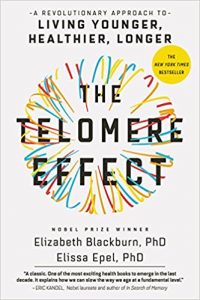The Telomere Effect: a revolutionary approach to living younger, healthier, longer
Elizabeth Blackburn, PhD and Elissa Epel, PhD, Grand Central Publishing, New York, 2017. 398pp. ISBN 9781455587988. $17.99
The Telomere Effect: a revolutionary approach to living younger, healthier, longer by Elizabeth Blackburn and Elissa Epel, gives us the science that connects our thoughts and behaviors to the lengthening or shortening of our healthspan. “Aging is defined as the cell’s progressive functional impairment and reduced capacity to respond appropriately to environmental stimuli and injuries.” (p 23)
Elizabeth was studying telomeres in pond scum while Elissa was studying chronic stress in mothers of severely debilitated children. Together they showed that the length of telomeres impacts lifespan and healthspan. They showed that factors such as chronic stress, home address and more can shorten our telomeres. They also showed that we have the power to impact our telomeres, potentially ensuring years of life brimming with good health.
Telomeres are the capping structures at the end of our DNA in our chromosomes inside the nucleus of our cells. As our telomeres get shorter, our life becomes shadowed with disease and aging on a cellular level. Our telomeres listen to us; the way we live can signal our telomeres to speed up the cellular aging process, or it can do the opposite. The foods we eat, our response to emotional challenges, the amount of exercise we incorporate into our lives, stress we experienced as children, and even our neighborhood address all appear to influence our telomeres. How we live our lives, inwardly and outwardly, individually and collectively impacts our well-being, both on an individual level, and collectively. Doing your part to foster healthy cell renewal will increase your healthspan.
This dynamic book introduces the reader to the profundity of telomere science and its intentional application to reduce chronic disease and improving wellbeing.
—
References & notes
Endorsements in the front of Blackburn’s Telomere Effect: a revolutionary approach to living younger, healthier, longer:
“…telomeres, the capping structure at the end of your DNA that make up your chromosomes,” Eric Kandel, Nobel laureate, author of In Search of Memory: The Emergence of a New Science of Mind
“As your telomeres get shorter, your life gets clouded with disease…comprehensive lifestyle changes may actually increase the length of our telomeres, thus beginning to reverse aging on a cellular level.” Dean Ornish
“…how we live our lives both inwardly and outwardly, individually and collectively [impacts] our health, our well-being and…our longevity.” Jon Kabat-Zinn
Notes from the book:
“Your telomeres…are listening to you…The way you live can tell your telomeres to speed up the process of cellular aging…[or] the opposite. The foods you eat, your response to emotional challenges, the amount of exercise you get, whether you were exposed to childhood stress, even the level of trust and safety in your neighborhood appear to influence your telomeres. …one of the keys to a long healthspan is simply doing your part to foster healthy cell renewal.
We age on the inside of our cells. Eventually our cells become senescent. They can leak pro-inflammatory substance that make you vulnerable to more pain, more chronic illness. Many senescent cells will undergo a preprogrammed death.” Pg 9
Your genes affect your telomeres, both their length when you’re born and how quickly they dwindle down. Research has shown you can step in and take some control of how short or long – how robust – they are.” Pg 12
“[This] book tells you how to use telomere science to support your cells…changes that you can make to your mental habits and then to your body…exercise, food and sleep routines that are best for telomeres…determine whether your social and physical environments support your telomere health” and your healthspan. Pg 14
“Your body is full of cells that need to constantly renew themselves to stay healthy. These renewing cells are called proliferative cells. They live in places like your: immune system, gut, bones, lungs, liver, skin, hair follicles, pancreas, cardiovascular system, heart’s smooth muscle cells, brain.” Pg 21
“Aging is defined as the cell’s progressive functional impairment and reduced capacity to respond appropriately to environmental stimuli and injuries.” Pg 23
The Telomere Effect: a revolutionary approach to living younger, healthier, longer

